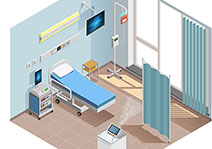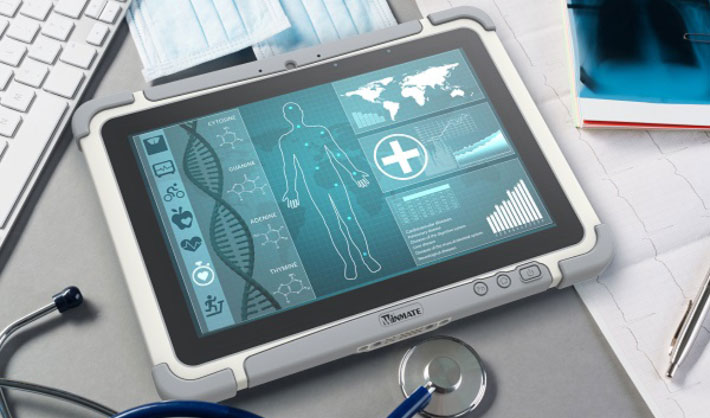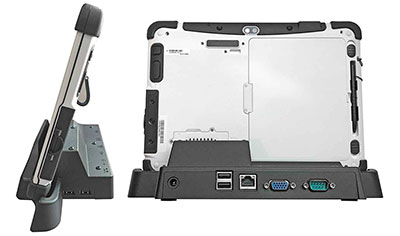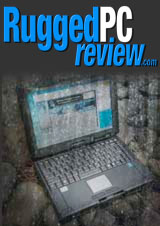|
|
Talking with Rugged Computing Industry Leaders:
Ken Lu, CEO at Winmate Inc, about reactions of the rugged computing industry to the COVID-19 pandemic
Periodically, we ask industry leaders in the rugged computing and communications market questions about their products, their views, and their opinions on trends, emerging technologies and a variety of other issues. In this segment we asked Mr. Ken Lu, CEO at Winmate Inc, about the challenges and opportunities of the rugged computing sector in this era of the COVID-19 pandemic.
RuggedPCReview: It is not a secret that the COVID-19 pandemic has, to various degrees, changed almost every aspect of life around the globe. This has resulted in enormous challenges and new opportunities for designers and manufacturers of ruggedized vertical market computing and communications equipment. What does this mean for Winmate?
 Ken Lu, Winmate: The outbreak of coronavirus COVID-19 shows that not all healthcare facilities are ready for such a massive pandemic. At the beginning of the pandemic, healthcare systems worldwide were overwhelmed. Not only healthcare personnel, but also technical facilities were not ready. Ken Lu, Winmate: The outbreak of coronavirus COVID-19 shows that not all healthcare facilities are ready for such a massive pandemic. At the beginning of the pandemic, healthcare systems worldwide were overwhelmed. Not only healthcare personnel, but also technical facilities were not ready.
New challenges always come together with new opportunities. COVID-19 brings the era of healthcare tablet digitization. Healthcare grade tablet computers prove to be an effective communication and data collection tool for those combating COVID-19 on the front line. The rugged application-focused healthcare grade tablet computers offer a new generation of convenience for healthcare professionals, data collection and transfer, diagnosis checking and updatin patient information in real-time.
At Winmate, we see the current COVID-19 pandemic as a turning point to increase the manufacturing capacity for medical-grade products and offer more rugged computer solutions certified for the healthcare market. We offer healthcare-grade rugged mobile devices solutions to accelerate digitalization initiatives to create truly connected and highly profitable organizations, empower remote workers and remain competitive even at the time of the global pandemic.
RuggedPCReview: While backroom IT systems in healthcare settings don't differ much from IT technology used in other sectors, anything used in patient areas, for patient examination and treatment must conform to different rules, regulations, and design and functionality re-quirements beyond simple color schemes. How do you see that, and what are Winmate's experience and qualifications in health care markets?
Ken Lu, Winmate: Winmate's eco-friendly healthcare products provide convenient-to-use platforms and prolonged services for processing comprehensive health data of inter-hospital healthcare systems. Winmate also provides enterprises and system integrators with solutions covering integrated network technology, computing platforms, and custom (customized) healthcare and IT products.
With well-planned production processes, well-established quality control and real-time quality problem reporting systems, Winmate guarantees the overall design, manufacture, and post-delivery service of its products and ensures that the healthcare products it designs and manufactures meet the healthcare IT platform demands of customers. With accurate market positioning and customer-demand-oriented differentiated services, Winmate has successfully evolved from a manufacturer with R&D capacity into a supplier of healthcare tablet solutions with core competitiveness.
RuggedPCReview: Could you describe specific Winmate products and projects addressing the new realities of the COVID-19 pandemic era.
 Ken Lu, Winmate: In 2021, Winmate received an order for medical-grade rugged tablet PCs from leading medical device manufacturers in North America.
Ken Lu, Winmate: In 2021, Winmate received an order for medical-grade rugged tablet PCs from leading medical device manufacturers in North America.
These medical-grade rugged tablet PCs are used for smart healthcare automation, such as high-sensitivity emergency rooms or operating rooms. They also provide patients with telemonitoring and home healthcare and nursing services to meet telecare demand during the COVID-19 pandemic.
The latest UHD 4K medical-grade display is designed for medical imaging management systems at out-patient clinics and nursing stations, and routine healthcare systems in hospitals.
RuggedPCReview: We see many products described as having "antimicrobial" properties. "Antimicrobial" is a summary term that includes bacteria as well as viruses, fungi, and protozoa. Given that the primary current issue is viral contamination — COVID-19 — the question then becomes whether a company's antimicrobial compounds also have antiviral properties that would make antimicrobial plastics and coatings exponentially more interesting and valuable. What is Winmate's antimicrobial approach? What can it do, and what can it not do?
Ken Lu, Winmate: Winmate rugged tablets' housings are enhanced with antibacterial properties that minimize bacterial growth. They are waterproof and resistant to various cleaning chemicals. This allows cleaning surfaces with wipes, sprays, and liquids without concern of affecting internal components. The active antibacterial ingredient in product surfaces is safe for 24/7 days use with standard chemical disinfection procedures employed in medical environments, at home, and in public places. And they work even if an object has indentations or scratches.

RuggedPCReview: Unlike most enterprise IT systems that, for the most part, use established and standardized interface technologies, medical systems must frequently interface with highly specialized and non-standard medical scanning, monitoring, and processing systems or peripherals. Addressing these issues is imperative in facilitating and advancing healthcare delivery's safety, efficiency, and affordability. How does Winmate see these medical interoperability challenges?
Ken Lu, Winmate: Data is transforming medical care in the age of COVID-19. Utilizing data-based treatments, medical professionals can quickly identify and interpret symptoms, determine appropriate therapies, track patient status with higher precision, and overall enhance individual care.
Medical professionals can only realize these benefits if data is readily available comprehensive, accurate, and continuously updated. For this to happen, frontline staff must have appropriate mobile technology and all the right systems in place. All these systems must interact seamlessly and transparently to ensure that regardless of who is gathering the data, on what device or operating system, the information is promptly available to all licensed and pertinent systems and users.
Tablet computer systems offer a new generation of ease-of-use for healthcare experts, accumulate and transfer information, examine the medical diagnosis, and update patient info in real-time. When selecting a tablet computer for medical care, it is necessary to consider safety, durability, and performance.

RuggedPCReview: In the rugged computing industry, we often use the term "industrial grade" when referring to materials, technologies, and qualities used in ruggedized computing products. Winmate often uses the term "healthcare grade." How would you define the term, and what are some specific examples of "healthcare grade" materials, technologies, and qualities?
Ken Lu, Winmate: Deployment of portable devices opens unlimited opportunity in the medical environment that can provide safety, long life-time, and stable performance. However, not all devices are suitable for medical applications. There are key criteria to be considered when choosing the most appropriate medical tablets for hospital and clinic environments. Medical facilities are for patient care and it is their utmost responsibility to meet patients' needs. Technology and workflows must be optimized and meet medical industry standards and expectations. Medical tablets for healthcare must meet pertinent medical certifications, be rugged enough for the job, must be easy to use, offer power and portability, and use antimicrobial, liquid-resistant housings.
- Medical Grade Certifications — Devices must meet medical certifications IEC/ EN 60601-1, 60601-1-2 that reduce the risk of electrical shock and guarantee safe operation in healthcare settings without electromagnetic interference. For safer environment, the Center for Disease Control and Prevention (CDC) recommends waterproof front bezels and hygienic aluminum housings in medical facilities for routine disinfection with liquid disinfectants.
- Ruggedness — Although the initial investment of choosing rugged devices may be higher, their design guarantees a longer life-time that results in a lower Total Cost of Ownership (TCO). An example of extra ruggedness: If installed on a medical cart or inside an ambulance, tablets and docking stations must be able to withstand potentially intense vibration without anything getting disconnected or coming loose.
- Ease of use — Medical tablets must be comfortable to hold and easy to use. Patient and physicians' signatures must be easily captured electronically. Tablets should include HIPAA-compliant applications, allowing physicians to write prescriptions from the tablet. Consent forms and other essential documents should be signable with ease. Medical tablets should also come with a stylus pen designed for signing prescriptions and other documents. Another essential feature in a medical tablet is barcode scanning for tasks like scanning patient wristbands and barcodes on medications.
- Power & Portability — Tablets for use in healthcare must provide adequate of storage to hold vital information such as patient records and prescriptions. Medical tablets should be small and light, yet provide enough performance to, for example, simultaneously run EMR and other medical applications. Good medical tablets can redefine workflows in medical facilities due to their power and portability.

RuggedPCReview: Winmate documents often refer to "smart healthcare." What is your definition of smart healthcare, what are some examples of smart healthcare systems, and how can smart healthcare approaches advance the fight against COVID-19?
Ken Lu, Winmate: Smart healthcare provides modern healthcare services by integrating information and healthcare systems with advanced network systems. It optimizes disease prevention and diagnosis for medical personnel to make efficient and correct judgments, reduce human-induced negligence, and help the proper allocation of medical resources to solve workforce shortage problems. Smart healthcare covers electronic medical records (EMR), cloud digital diagnosis, telecare, mobile healthcare, wearables, and others. Strictly speaking, smart healthcare focuses on "smart hospitals" characterized by high complexity and technical thresholds. Smart healthcare is patient-centered, emphasizing the prevention of malpractice, reduction of medical costs, and enhancement of care efficiency.
The rise of smartphones and tablets has changed our lives and lifestyles. In 2011, the USFDA approved physicians' use of handheld devices for diagnostic, and medical personnel to legally present patients' medical reports and records and even do prescriptions. All of this is made possible by ubiquitous access, real-time updates, and the convenience of browsing on mobile devices.  Handheld devices also enable physicians to enhance mobility at work and provide patient care more efficiently. Handheld devices also enable physicians to enhance mobility at work and provide patient care more efficiently.
At Winmate, we developing products that the market wants and needs. Recently we have been awarded an order for rugged tablet PCs from a leading US healthcare product manufacturer. We attribute that to Winmate having a strong R&D team that explores fundamentals and solves technical problems and allowed Winmate to have core patents.
We believe in continuing innovation and R&D to enhance the efficiency of smart production lines, and we practice a very customer-centered culture that adheres to our "reciprocity" business philosophy. We continually advance the concept of rugged industrial computers, integrate forward-looking technologies, and use our project management experience to lead transformation in the digital economy and thereby become the most valuable and trustworthy partners of customers possible.
RuggedPCReview: Anything else you would like to add regarding Winmate's role and position in providing healthcare technology?
Ken Lu, Winmate: In my opinion, there are three elements to run a profitable business: concentration, feasible business model, and competitive products.
To achieve these goals, every Winmate employee is expected to show and maintain enthusiasm to design, produce, and provide the world's best products and services to help customers create value. Only a disciplined culture, disciplined employees, disciplined thinking, and disciplined action can create a different and great company. Winmate continually strengthens talent development in Taiwan through industry-academia collaboration and establishment of a foundation to cultivate technology talents. This year, Winmate will expand the recruitment scale with 50% R&D vacancies to cope with the expanding market.
While the market and customers keep changing, Winmate must make continual innovation to develop products that meet market trends and customer demand. We have a well-organized professional IT team dedicated to continually innovating and optimizing our production system's efficiency. We have a vital enterprise resource planning (ERP) system, excellent organizational capacity, and effective cost-cutting. These are the keys that enables Winmate to provide "high-mix, low-volume" service while maintaining profits at the same time.

Ken Lu is CEO of Winmate Inc. and has been with Winmate since 1998. Mr. Lin holds an Master's degree from Melbourne Business School.
|





